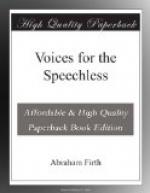The horse as wanton, and almost as fleet,
That skips the spacious meadow at full speed,
Then stops, and snorts, and throwing high his heels,
Starts to the voluntary race again;
The very kine that gambol at high noon,
The total herd receiving first from one
That leads the dance a summons to be gay,
Though wild their strange vagaries, and uncouth
Their efforts, yet resolved with one consent
To give such act and utterance as they may
To ecstasy too big to be suppressed—
These and a thousand images of bliss,
With which kind Nature graces every scene,
Where cruel man defeats not her design,
Impart to the benevolent, who wish
All that are capable of pleasure pleased,
A far superior happiness to theirs,
The comfort of a reasonable joy.
Cowper.
* * * * *
No grain of sand.
The very meanest things are
made supreme
With innate ecstasy.
No grain of sand
But moves a bright
and million-peopled land,
And hath its Edens and its
Eves, I deem.
For love, though blind himself,
a curious eye
Hath lent me,
to behold the heart of things,
And touched mine ear with
power. Thus, far or nigh,
Minute or mighty,
fixed or free with wings,
Delight, from many a nameless
covert sly,
Peeps sparkling,
and in tones familiar sings.
Laman Blanchard.
* * * * *
Humanity, mercy, and benevolence.
When that great and far-reaching softener of hearts, the sense of our failures and offences, is vividly present, the position we hold to creatures who have never done wrong is always found inexpressibly touching. To be kind to them, and rejoice in their happiness, seems just one of the few ways in which we can act a godlike part in our little sphere, and display the mercy for which we hope in turn. The only befitting feeling for human beings to entertain toward brutes is—as the very word suggests—the feeling of Humanity; or, as we may interpret it, the sentiment of sympathy, as far as we can cultivate fellow feeling; of Pity so far so we know them to suffer; of Mercy so far as we can spare their sufferings; of Kindness and Benevolence, so far as it is in our power to make them happy.
MISS F. P. COBBE.
* * * * *
LIVING CREATURES.
What call’st thou solitude?
Is mother earth
With various living creatures,
and the air
Replenished, and all these
at thy command
To come and play before thee?
Know’st thou not
Their language and their ways?
They also know,
And reason not contemptibly;
with these
Find pastime, and bear rule;
thy realm is large.




